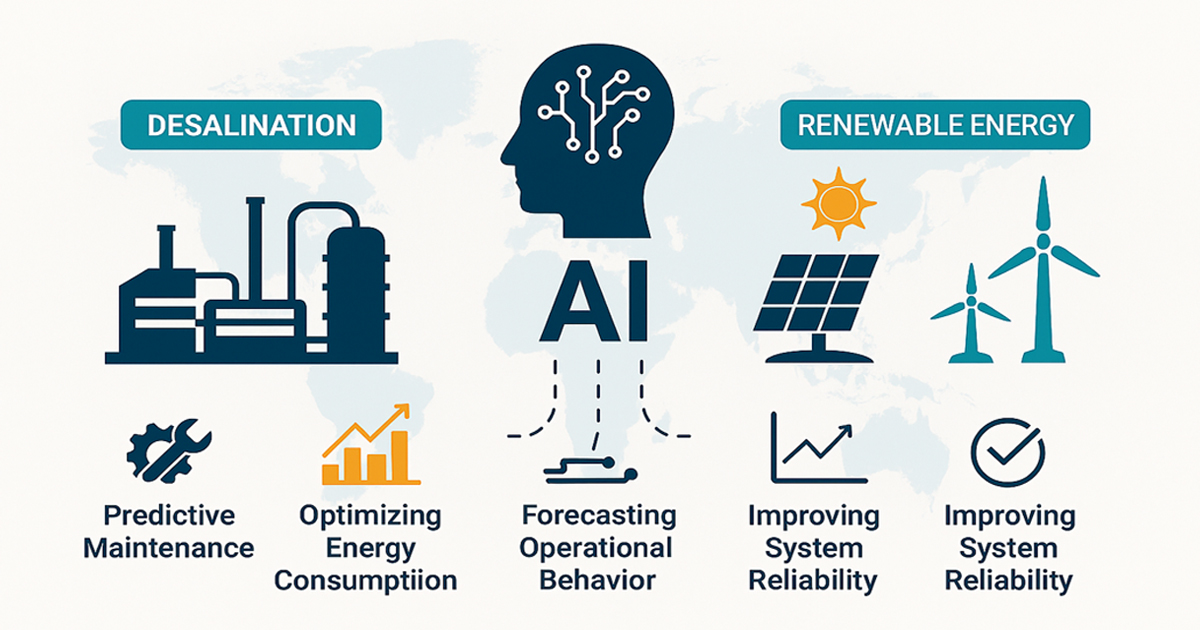Applications of Artificial Intelligence in the Sustainable Operation of Desalination and Renewable Energy Systems
A special issue of Energies (ISSN 1996-1073). This special issue belongs to the section "B: Energy and Environment".
Deadline for manuscript submissions: 24 April 2026 | Viewed by 333

Special Issue Editors
Interests: renewable energy; desalination systems; salinity gradient based power (SGP) generation systems; carbon capture; artificial neural network- based process optimization
Special Issues, Collections and Topics in MDPI journals
Special Issue Information
Dear Colleagues,
Water scarcity and the rising demand for clean energy are two of the most pressing global challenges. Desalination technologies, such as reverse osmosis (RO), multi-stage flash (MSF), multi-effect distillation (MED), electrodialysis (ED), forward osmosis (FO), membrane distillation (MD), and solar desalination, provide critical solutions for water scarcity. Similarly, renewable energy technologies—solar photovoltaic (PV), wind, hydro, geothermal, and bioenergy—are pivotal to mitigating climate change and promoting sustainable development.
However, both desalination and renewable energy operations face challenges around energy intensity, operational inefficiencies, intermittency, and maintenance issues. Integrating Artificial Intelligence (AI) into these systems offers the transformative potential to address these challenges by enhancing predictive maintenance, optimizing energy consumption, forecasting operational behavior, and improving system reliability and performance.
AI-driven techniques such as machine learning (ML), deep learning (DL), artificial neural networks (ANN), genetic algorithms (GA), reinforcement learning (RL), and hybrid models can revolutionize desalination and renewable energy operations. Applied correctly, AI can significantly lower operational costs, reduce downtime, enhance fault detection, and enable smart, autonomous system management. If not embraced, the sector risks continuing high inefficiencies, energy wastage, and unsustainable operations, further exacerbating global water and energy crises.
Therefore, this Special Issue will focus on harnessing AI for the sustainable, optimized, and intelligent operation of desalination and renewable energy systems, contributing significantly toward global sustainability goals.
Aim and Scope
This Special Issue aims to consolidate cutting-edge research on the application of AI techniques for the sustainable operation, optimization, and performance enhancement of desalination and renewable energy technologies.
We seek original research articles, review papers, case studies, and perspective pieces that explore the following:
- AI-based operational optimization for desalination systems (all types);
- Performance prediction and enhancement of renewable energy systems using AI;
- Energy consumption forecasting and optimization;
- Hybrid systems that combine renewable energy and desalination powered by AI;
- Development and implementation of ANN, ML, DL, and other AI approaches;
- Smart grid integration of renewable energy with intelligent control;
- Decision-making support systems and real-time operational control using AI;
- Sustainability assessment and life cycle analysis augmented by AI;
- Future trends, challenges, and opportunities at the intersection of AI, desalination, and renewable energy.
This Special Issue encourages interdisciplinary approaches that bridge the gap between environmental engineering, renewable energy, water desalination, and sustainability studies.
Topics of interest for this Special Issue include, but are not limited to, the following:
Desalination systems:
- AI applications in RO, CDI, MSF, MED, ED, FO, MD, and solar desalination;
- Predictive maintenance and operational optimization.
Renewable energy systems:
- AI for solar PV, wind, SGP, hydro, geothermal, and biomass energy forecasting and systems performance improvement;
- Smart grid integration and hybrid renewable systems management;
- AI-enhanced sustainability and life cycle assessments;
Dr. Muhammad Wajid Saleem
Dr. Hassan Ali
Guest Editors
Manuscript Submission Information
Manuscripts should be submitted online at www.mdpi.com by registering and logging in to this website. Once you are registered, click here to go to the submission form. Manuscripts can be submitted until the deadline. All submissions that pass pre-check are peer-reviewed. Accepted papers will be published continuously in the journal (as soon as accepted) and will be listed together on the special issue website. Research articles, review articles as well as short communications are invited. For planned papers, a title and short abstract (about 250 words) can be sent to the Editorial Office for assessment.
Submitted manuscripts should not have been published previously, nor be under consideration for publication elsewhere (except conference proceedings papers). All manuscripts are thoroughly refereed through a single-blind peer-review process. A guide for authors and other relevant information for submission of manuscripts is available on the Instructions for Authors page. Energies is an international peer-reviewed open access semimonthly journal published by MDPI.
Please visit the Instructions for Authors page before submitting a manuscript. The Article Processing Charge (APC) for publication in this open access journal is 2600 CHF (Swiss Francs). Submitted papers should be well formatted and use good English. Authors may use MDPI's English editing service prior to publication or during author revisions.
Keywords
- artificial intelligence in water treatment
- the optimization of sustainable energy systems
- renewable energy integration with desalination
- AI for water-derived energy efficiency
- smart water desalination technologies
- machine learning in renewable energy forecasting
- hybrid renewable energy solutions
- energy consumption optimization with AI
- AI-driven performance enhancement in energy systems
- data-driven solutions for water desalination
Benefits of Publishing in a Special Issue
- Ease of navigation: Grouping papers by topic helps scholars navigate broad scope journals more efficiently.
- Greater discoverability: Special Issues support the reach and impact of scientific research. Articles in Special Issues are more discoverable and cited more frequently.
- Expansion of research network: Special Issues facilitate connections among authors, fostering scientific collaborations.
- External promotion: Articles in Special Issues are often promoted through the journal's social media, increasing their visibility.
- Reprint: MDPI Books provides the opportunity to republish successful Special Issues in book format, both online and in print.
Further information on MDPI's Special Issue policies can be found here.






